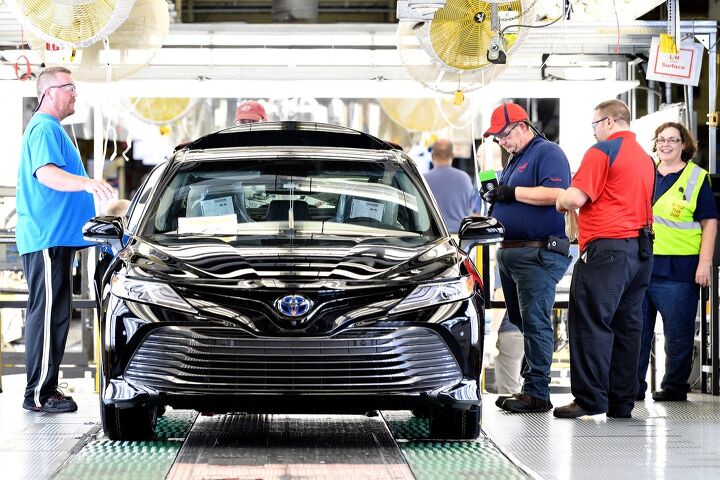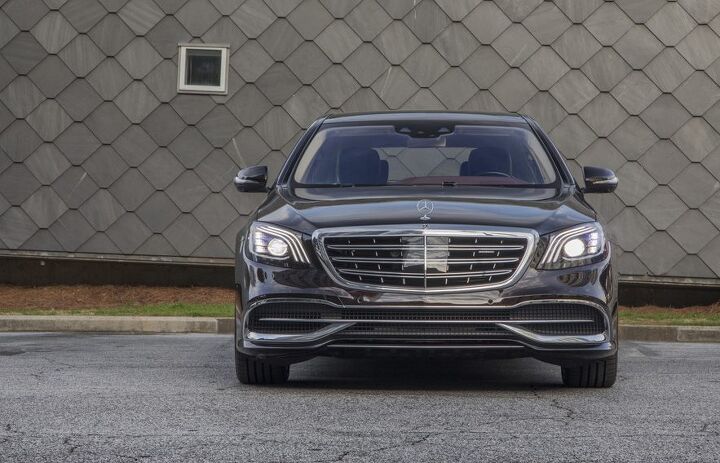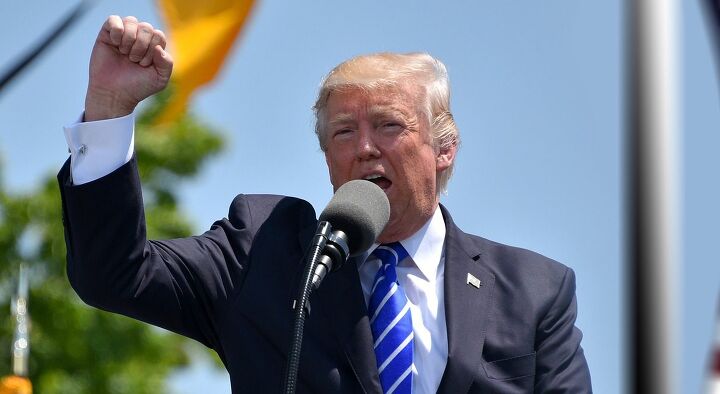#TradeRelations
An Exhaustive List of Everything Automakers Want You to Know About Trump's Import Investigation (Hint: Higher Prices, Fewer Jobs)
It’s no secret that the automotive industry has come out universally against the Trump administration’s proposal to increase import tariffs. Numerous manufacturers weighed in independently on the issue as trade groups rise in opposition to the U.S. Commerce Department’s national security investigation.
The industry’s claim that imported vehicles don’t pose a risk to the wellbeing of the United States seems to have fallen on deaf ears. Threats that the prospective import duties on parts could result in fewer, more-expensive automobiles being produced domestically have been heard — and rebuked — by President Trump.
“What’s really going to happen is there’s going to be no tax,” he told Fox News in a weekend broadcast. “You know why? They’re going to build their cars in America. They’re going to make them here.”
However, automakers, parts suppliers, and even local governments have submitted comments to the Commerce Department ahead of the hearings scheduled for July 19th — and they’re all incredibly negative.
French President Convinced Trump Wants to Kill German Cars; Steel Tariffs Strike U.S. Allies
There’s been quite a bit of the old “he said, she said” as the global trade war between developed nations coalesces. Germany has not covered U.S. President Donald Trump’s trade policy favorably, not that it has much reason to. His new tariffs on imported steel and aluminum has tested relationships with numerous countries and, while it isn’t the biggest exporter of metal to the United States, Germany has something to lose. Likewise, proposed duties on passenger vehicles have sincerely rubbed Deutschland the wrong way.
However, the issue was further complicated this week after a gossipy report surfaced claiming Trump told French President Emmanuel Macron in April that he would continue hampering the European auto manufacturers until there are no Mercedes-Benz vehicles driving in America.
Trade War Watch: U.S. Public to Have a Say on Auto Import Threat
There was a mighty blowback against the Trump administration’s suggestion to elevate tariffs to as much as 25 percent on all foreign-built passenger vehicles.
Already reeling from fresh import fees on aluminum and steel, Europe expressed its collective distaste on new taxes while Japan vowed to plead a strong case for itself. Meanwhile, prominent politicians and two of the largest automotive trade groups in the country came forward to condemn the plan, stating it was “confident that vehicle imports do not pose a national security risk” to the United States.
While the administration has already launched its investigation to determine whether vehicle and auto part importers threaten the industry’s health and ability to develop advanced technologies, the government noted that a second opinion wouldn’t hurt. Announced on Tuesday in the Federal Register, the the Commerce Department will allot two days in July for public comments on the matter.
Trade War Watch: Automakers Respond to U.S. Import Investigation, Japan Keeps the Faith
President Trump announced a security investigation into auto imports last week, tasking Commerce Secretary Wilbur Ross with the job. His goal will be to determine what effects imported vehicles have on the national security of the United States under Section 232 of the Trade Expansion Act of 1962 — which sounds like a monumental and rather complex task.
Basically, Ross will examine whether or not the U.S. can get away with escalating automotive tariffs. That’s a touchy subject, considering how contentious global trade has become in recent months. Worse yet, the 80-year-old commerce secretary will have to continue promoting American businesses and industries outside its borders while deciding on an issue few trade partners will be happy with.
Automakers aren’t thrilled either. After Trump announced the investigation, the Association of Global Automakers and Alliance of Automobile Manufacturers both said they didn’t believe vehicle imports posed a national security risk. “To our knowledge, no one is asking for this protection. If these tariffs are imposed, consumers are going to take a big hit,” said John Bozella, President of Global Automakers, in a statement. “This course of action will undermine the health and competitiveness of the U.S. auto industry.”
Trade War Watch: Trump Launches National Security Investigation On Auto Imports
President Donald Trump issued a tweet promising car manufacturers good tidings on Wednesday. “There will be big news coming soon for our great American Autoworkers,” he said. “After many decades of losing your jobs to other countries, you have waited long enough!”
Later that same day, the administration announced it had launched a national security investigation into car and truck imports under Section 232 of the Trade Expansion Act of 1962. The Commerce Department explained that the probe would investigate whether imported vehicles and parts threaten the domestic industry’s wellbeing, taking into account its ability to develop new technologies and the impact of tariffs.
“There is evidence suggesting that, for decades, imports from abroad have eroded our domestic auto industry,” Commerce Secretary Wilbur Ross said.
Trade War Watch: China to Reduce Import Tariffs for Cars and Components
China has announced plans to slash import fees on automobiles to 15 percent starting this July. While the tariff currently rides high at 25 percent, the country’s Ministry of Finance said reducing it was part of an intentional effort to open up China’s markets and spur development within the local automotive sector.
It may also have been part of a peace offering. President Donald Trump has been pretty clear on China’s trade policies with the United States, frequently referring to them as unfair. The U.S. imposes a svelte 2.5 percent fee on imported vehicles — unless we’re talking about trucks. “Does that sound like free or fair trade?” Trump tweeted last month. “No, it sounds like STUPID TRADE — going on for years!”
China Plans to Open Car Market By 2022
After weeks of unpleasant trade talk and posturing between Washington and Beijing, China’s lead economic planner announced the country would be easing limits on foreign ownership of automotive ventures. While an official metric was not posted, it will be less than the current 50-percent cap non-Chinese automakers have been limited to since 1994. But, for all we know, China may be seeking to scrap the mandate entirely.
We did, however, get a timeline. On Tuesday, the People’s Republic announced it would remove foreign ownership caps for companies making fully electric and plug-in hybrid vehicles this year — followed by commercial vehicle manufacturers in 2020 and the rest of the car market by 2022.






















Recent Comments